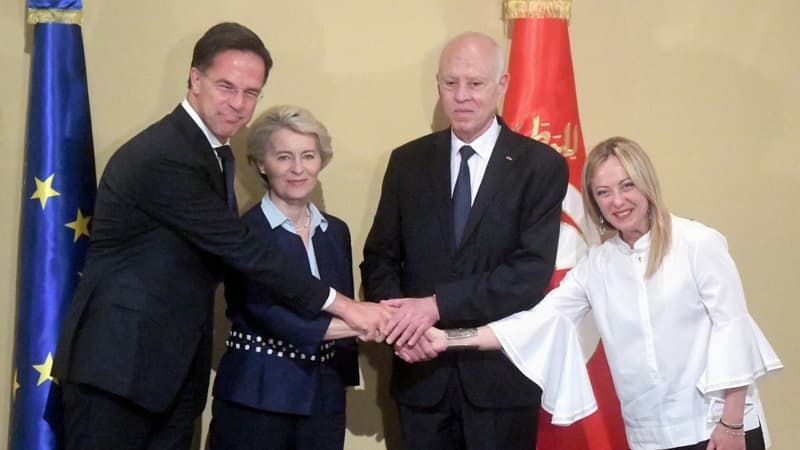The European Union and Tunisia concluded this Sunday in Tunisia a “strategic association” focused on the fight against irregular immigration but which also aims to support the North African country in the face of serious economic difficulties.
European Commission President Ursula von der Leyen welcomed an agreement that will “invest in shared prosperity”, referring to the “five pillars”, including the very important issue of migration.
Tunisia is the main departure point with Libya for thousands of migrants crossing the central Mediterranean to Europe.
“New Milestone”
The Italian heads of government Giorgia Meloni and the Dutchman Mark Rutte accompanied the European leader after a first visit a month ago by the trio, in which they had proposed this association.
The five pillars are “macroeconomic stability, trade and investment, green energy transition, union of people, migration and mobility”, the Commission specifies in a press release.
The memorandum of understanding marks “an important new step to address the migration crisis in an integrated manner,” said Giorgia Meloni, who invited Tunisian President Kais Saied to participate in a summit on migration next Sunday in Rome.
Specifically, the expansion of the Erasmus exchange program to Tunisia and aid of 65 million euros for 80 schools are planned.
Irregular immigration control
On the energy side, the European leaders recalled that Tunisia is concerned about the fiber optic submarine cable and electric cable projects to connect the two shores of the Mediterranean. In this sense, the EU wants to support the development of renewable energies in the North African country, which has “enormous potential”, Ursula von der Leyen stressed.
According to Giorgia Meloni, the association between Tunisia and the European Union (EU) “can be considered as a model for the establishment of new relations with North Africa”.
Regarding immigration, Mark Rutte considered that the agreement “will better control irregular immigration.”
President Saied raised this issue in front of his counterparts, calling for “a collective agreement on inhumane immigration and on (forced) displacement operations by criminal networks.”
increasingly xenophobic discourse
“The Tunisians gave these immigrants everything they could offer with unlimited generosity,” pleads Kais Saied, harshly criticized for the way hundreds of immigrants were detained in Tunisia and then “deported,” according to NGOs, to inhospitable areas. at the borders. with Algeria and Libya.
An increasingly openly xenophobic discourse has spread in Tunisia since Kais Saied, who assumed full power in July 2021, denounced illegal immigration in February, referring to “hordes of sub-Saharan immigrants” who had come, according to him, “to change the demographics. composition” of the country.
Specifically, the agreement between Brussels and Tunisia provides for aid of 105 million euros to fight against irregular immigration.
Economic crisis
The EU has also promised direct budget aid of €150 million in 2023 while Tunisia, strangled by debt at 80% of its GDP, is short of liquidity, causing periodic shortages of basic necessities purchased directly by the state. .
On its first visit, the European troika had mentioned a “macro-financial assistance of 900 million euros”, in the form of a loan that would have been granted to Tunisia in the coming years.
Ursula von der Leyen said on Sunday that Brussels remained “ready to provide this assistance as soon as the conditions are met.”
But this “assistance” is conditional on an agreement between Tunisia and the International Monetary Fund (IMF) on a new loan of 2,000 million dollars, a file that has been stalled for months.
President Saied rejects two essential conditions for an agreement with the IMF: the lifting of subsidies on basic products and the restructuring of state-owned companies in difficulties. We must “find new means of cooperation outside the international monetary framework,” he said.
Source: BFM TV


